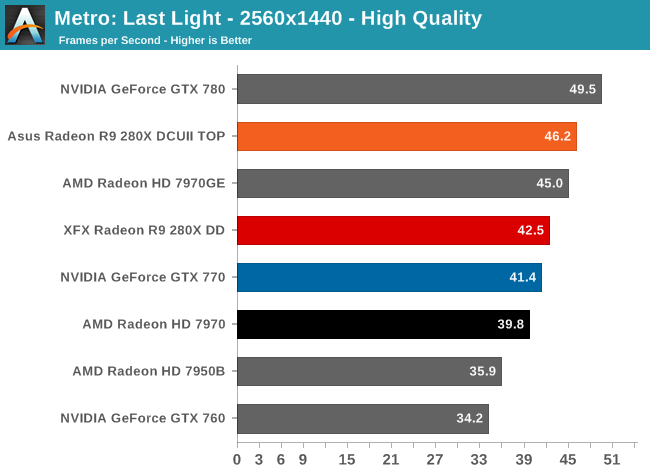The Radeon R9 280X Review: Feat. Asus & XFX - Meet The Radeon 200 Series
by Ryan Smith on October 8, 2013 12:01 AM ESTMetro: Last Light
Kicking off our look at performance is 4A Games’ latest entry in their Metro series of subterranean shooters, Metro: Last Light. The original Metro: 2033 was a graphically punishing game for its time and Metro: Last Light is in its own right too. On the other hand it scales well with resolution and quality settings, so it’s still playable on lower end hardware.



The first benchmark in our revised benchmark suite finds our 280X cards doing well for themselves, and surprisingly not all that far off from the final averages. Setting the baseline here, as we expected the Tahiti based 280X performs in between the original 7970 and 7970 GHz Edition, thanks to the 280X’s use of PowerTune Boost but at lower clockspeeds than the 7970GE. Consequently this isn’t performance we haven’t seen before, but it’s very much worth keeping in mind that the 7970GE was a $400 card while the 280X is a $300 card, so approaching the 7970GE for $100 less is something of a significant price cut for the performance.
As for the immediate competitive comparison, we’ll be paying particular attention to 2560x1440, which should be the sweet spot resolution for this card. At 2560 we can see that the reference clocked 280X doesn’t just hang with the $400 GTX 770 but actually manages to edge it out by just over a frame per second. As a preface we’re going to see these two cards go back and forth throughout our benchmarks, but to be able to directly compete with NVIDIA’s fastest GK104 card for $100 less is a significant accomplishment for AMD.
Finally, let’s quickly talk about the Asus 280X versus the XFX 280X. Asus winning comes as no great shock due to their factory overclock, but now we finally get to see the magnitude of the performance gains from that overclock. At 2560 we’re looking at just shy of a 9% performance gain, which is in excess of both the boost clock overclock and the memory overclock. The specific performance gains will of course depend in the game in question, but this means that the performance gains in at least one instance are being impacted by the base clock overclock, the larger of Asus’s factory overclocks.










151 Comments
View All Comments
rs2 - Tuesday, October 8, 2013 - link
Would still appreciate an explanation regarding what those FP64 ratings actually mean.Ryan Smith - Tuesday, October 8, 2013 - link
FP64 execution speed relative to FP32 execution speed.aTaoZ - Tuesday, October 8, 2013 - link
Love how you guys posted the specs for R9 290X.Rogatti - Tuesday, October 8, 2013 - link
Mantle factor think is relevant (GCN any version)After R290..X review all the cards on the table...probably Christmas 2014 will be AMD
AMD is playing right...
swindmill - Wednesday, October 9, 2013 - link
"What AMD is doing is more than putting on a new coat of paint on the 7000 series but at the same time let’s be clear here: these products are still largely unchanged from the products we’ve seen almost 2 years ago."WTF does this even mean? It's a fracking rebadge, stop trying to make it seem otherwise! Anandtech is clearly on AMD's payroll...
HisDivineOrder - Wednesday, October 9, 2013 - link
Jet lag can make your writing skills unclear. Especially when from tropical island locales, even if it was weeks ago. It happens.Cut the man some slack. ;)
DMCalloway - Wednesday, October 9, 2013 - link
Asus' German site is already showing a R9 280X Matrix. If pricing follows the usual 1 to 1 conversion rate with the Euro then it should retail for a little over $300 here in the States. 12 phase power with an 1100 clock. Strong card for the money IMO. 7970 Matrix is still at $400.Soarta - Wednesday, October 9, 2013 - link
I'd like to know what are the core and memory freq. when the card is idle and connected to more than 1 display, not all of them being connected thru DP.narfsalot - Wednesday, October 9, 2013 - link
Any idea whether a Corsair VX550 will handle the 280x? no OC plannedDMCalloway - Wednesday, October 9, 2013 - link
41A on a single 12V line, you should be fine unless you're running a high OC on a 130W cpu. These cards like most 7970's have a 300W limit.